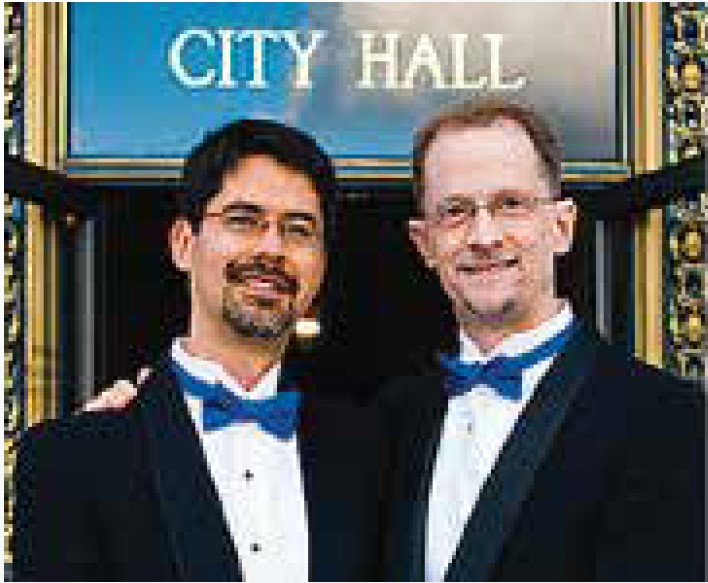
By Stuart Gaffney and John Lewis–
It was around 8 pm on Wednesday, March 4, 2009, the night before the California Supreme Court would hear oral argument as to whether Proposition 8, which had taken away the freedom to marry from loving LGBTIQ couples in California just 4 months before, violated the state constitution. We were leading a large rally on the steps of San Francisco City Hall to urge the court to strike down the unprecedented anti-LGBTIQ measure. As we neared the end of the rally, someone came up from behind and told us: “Kamala Harris is here and would love to speak.”
We were thrilled—and impressed. Prop. 8 had passed just months before with approximately 52 percent of the vote statewide. Harris, then San Francisco District Attorney, had already announced her candidacy for California Attorney General. She faced a tough primary race in her first bid for statewide office and an even greater challenge in being elected the state’s first Black, first Asian American, and first woman attorney general. But Harris was not about to balk on her commitment to marriage equality and LGBTIQ rights. She took time from her busy schedule and went out of her way to stand up for marriage equality and be there with the LGBTIQ community as we collectively continued to reel from the gut-wrenching passage of Prop. 8.
Moreover, after Harris’ election as California Attorney General, she refused to defend Prop. 8 in court, stating, “I firmly believe that Proposition 8 violates the equal protection and due process clauses of the U.S. Constitution.” Her refusal to defend the ignominious initiative was pivotal to its demise. Back in 2011, Harris expressed that she was “confident that justice will prevail,” and she was right.

We’ll never forget the afternoon of June 28, 2013, when the federal courts surprised everyone by enabling LGBTIQ couples in California to once again get married, not the usual 30 days after issuance of a U.S. Supreme Court decision, but just 2 days after the U.S. Supreme Court let stand a lower federal court ruling invalidating Prop. 8. We dropped everything and dashed to City Hall to join in the celebration with queer couples and fellow marriage equality supporters. And Kamala Harris was doing the same. In fact, she was rushing to City Hall to officiate at the wedding of Sandy Stier and Kris Perry, one of the plaintiff couples in the Prop. 8 federal lawsuit, tweeting “[o]n my way to S.F. City Hall. Let the wedding bells ring!”
And in the midst of the euphoria, Harris needed to fulfill her responsibilities as California’s highest-ranking law enforcement official. Local officials in Southern California were telling the other Prop 8 plaintiff couple, Paul Katami and Jeff Zarrillo, that the local clerk’s office could not issue the couple a marriage license until it received a directive from the State of California, clearly unaware that the Attorney General herself was about to officiate at Stier and Perry’s wedding.
Marriage equality supporters in Southern California soon got on the phone with people gathered at San Francisco City Hall, who told Harris what was going on. Harris got on the phone and didn’t skip a beat. She explained clearly and forcefully to the reluctant local clerk (clearly surprised to be talking to the Attorney General herself and not a staff member): “You must start the marriages immediately.” And Harris added with a smile, “Enjoy it. It’s going to be fun!”
Harris was already the joyful warrior.
Indeed, we remember the first time we met Harris personally, the morning of election day, November 8, 2005, in the Castro. The LGBTIQ community and pro-choice supporters were working in coalition to defeat Proposition 73, a right-wing initiative that threatened young women’s access to safe abortions statewide. We and many other volunteers were assembled preparing to go door to door to get out the vote. Harris spoke to us all, and with a big smile on her face exclaimed, “I love to campaign!” It was clear why. She loved connecting with people and inspiring them to exercise their agency in the political process.
And that’s what Harris and her running mate Tim Walz are doing today, inspiring a new generation to engage in the political process to boldly set forth a path for the future far different from their opponents. If those who cherish equality and democracy work together to elect Harris and Walz, himself a fearless and unabashed LGBTIQ rights supporter, the White House will remain a place that is not “going back,” and clearly has our backs as LGBTIQ people.
John Lewis and Stuart Gaffney, together for over three decades, were plaintiffs in the California case for equal marriage rights decided by the California Supreme Court in 2008. Their leadership in the grassroots organization Marriage Equality USA contributed in 2015 to making same-sex marriage legal nationwide.
6/26 and Beyond
Published on August 22, 2024
Recent Comments